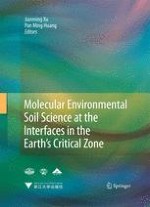2010 | OriginalPaper | Buchkapitel
Impacts of Mineral Colloids on the Transformation of Biomolecules and Physical and Chemical Protection of Soil Organic Carbon
verfasst von : Pan Ming Huang
Erschienen in: Molecular Environmental Soil Science at the Interfaces in the Earth’s Critical Zone
Verlag: Springer Berlin Heidelberg
Aktivieren Sie unsere intelligente Suche, um passende Fachinhalte oder Patente zu finden.
Wählen Sie Textabschnitte aus um mit Künstlicher Intelligenz passenden Patente zu finden. powered by
Markieren Sie Textabschnitte, um KI-gestützt weitere passende Inhalte zu finden. powered by
Soil mineral colloids, along with enzymes, have the ability to catalyze the transformation of biomolecules, which are from biological residues, root exudates, and biological metabolites, to relatively recalcitrant humic substances (HS). Virtually all HS in a wide range of soils are bound to mineral colloids, especially short-range ordered (SRO) Al and Fe (oxy) hydroxides because of their large specific surface area, high density of reactive sites, and surface reactivity. Soil mineral-HS complexes may anchor unstable plant constituents by various adsorptive forces and/or chemical binding. Highly degradable proteins, for example, may be protected against rapid biodegradation by their neucleophilic addition to mineralcomplexes. Besides chemical protection, mineral colloids have the ability to interact with biomolecules and microorganisms to form microaggregates. Furthermore, organic substances serve as intraicroaggregate binding agents leading to the formation of macroaggregates through biogenic aggregation processes. The vast majority (90%) of soil organic C (SOC) in surface soil is located within aggregates. Undecomposed biological materials have turnover times in terms of years. Turnover times of occluded SOC increase with decreasing aggregate size. SOC in macroaggregates has turnover times in terms of decades and the turnover times are about centennials for SOC in microaggregates. Tounover times of chemically protected SOC through binding to mineral surfaces usually approach millennia. Therefore, mineral colloids play a vital role in governing the transformation and turnover of soil organic matter and the impact on climate change.
